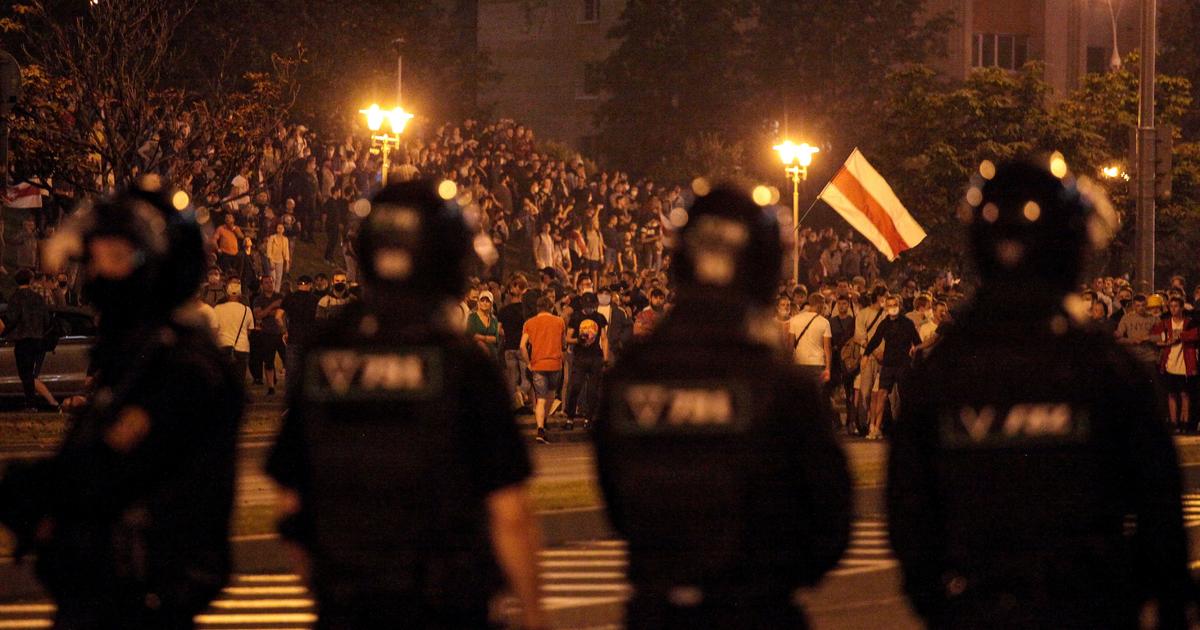Election officials in Belarus said Monday that the country’s longtime authoritarian leader, Alexander Lukashenko, had won his sixth consecutive presidential term with over 80% of the vote cast in his favor. The country’s central election commission announced the main opposition challenger, Sviatlana Tsikhanouskaya, had gotten only 9.9% of the vote as protests raged through the country.
Tsikhanouskaya, the wife of a jailed opposition blogger, had managed to unite opposition groups and draw tens of thousands to her campaign rallies, tapping growing anger over a stagnant economy and fatigue with Lukashenko’s autocratic rule.
Thousands of people took to the streets across Belarus on Sunday night, protesting preliminary results suggesting Lukashenko’s landslide victory. Human rights groups said one person was killed — which the authorities denied — and dozens were injured in a police crackdown on the demonstrations.
Tsikhanouskaya rejected the official figures, saying “I will believe my own eyes — the majority was for us.”
“The results of the vote announced by the central election commission don’t correspond with the reality and go completely against common sense,” Anna Krasulina, spokeswoman for Tsikhanouskaya, said Monday.
Widespread protests
On Sunday, demonstrators faced rows of riot police in black uniforms who moved quickly to disperse them, firing flash-bang grenades and beating them with truncheons. According to the Viasna human rights group, more than 200 people were detained, dozens sustained injuries, and one person was killed as the result of clashes with police.
One AP journalist was beaten by police and required medical treatment. At Minsk’s Hospital No. 10, an AP reporter saw a dozen ambulances delivering protesters with fragmentation wounds and cuts from stun grenades and other injuries.
Three journalists from the independent Russian TV station Dozhd were detained after interviewing an opposition figure and were deported.
Interior Ministry spokeswoman Olga Chemodanova said Monday that no one was killed during the protests, and officials wouldn’t say how many people were detained or injured. On Monday morning, Belarus’ Investigative Committee opened a criminal probe into mass riots and violence toward police officers.
“If you provoke, you will get the same answer”
Sunday’s brutal crackdown followed a tense campaign that saw massive rallies against Lukashenko, who has ruled the ex-Soviet nation with an iron fist for 26 years. European leaders had urged Belarusian authorities to adhere to standards of democracy and respect civil rights, but the Organization for Security and Cooperation in Europe, whose assessments of elections are widely regarded as authoritative, was not invited to send observers to witness the vote.
Polish President Andrzej Duda and Lithuanian President Gitanas Nausėda released a joint statement on Sunday night calling on Minsk “to refrain from violence and call for respect of fundamental freedoms, human and citizen rights including the rights of national minorities and freedom of speech.” Russian President Vladimir Putin, in the meantime, congratulated Lukashenko on his win on Monday, along with the president of Kazakhstan, Kassym-Jomart Tokayev. The results of the vote “indicate the popular support” of Lukashenko’s rule, Tokayev said. Lukashenko was defiant as he voted, warning that the opposition would meet a tough response. “If you provoke, you will get the same answer,” he said. “Do you want to try to overthrow the government, break something, wound, offend, and expect me or someone to kneel in front of you and kiss them and the sand onto which you wandered? This will not happen.” Tsikhanouskaya had crisscrossed the country, tapping into public frustration with a worsening economy and Lukashenko’s swaggering response to the pandemic. Belarus, a country of 9.5 million people, has reported more than 68,500 coronavirus cases and 580 deaths but critics have accused authorities of manipulating the figures to downplay the death toll. Lukashenko has dismissed the virus as “psychosis” and declined to apply measures to stop its spread, saying a lockdown would have doomed the already weak economy. He announced last month that he had been infected but had no symptoms and recovered quickly, allegedly thanks to playing sports. Yet for some voters, Lukashenko’s long, hard line rule was a plus. “He is an experienced politician, not a housewife who appeared out of nowhere and muddied the waters,” retiree Igor Rozhov said Sunday. “We need a strong hand that will not allow riots.”
